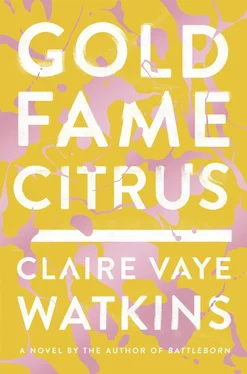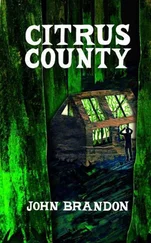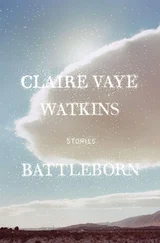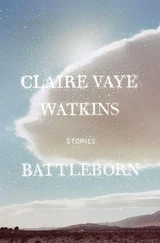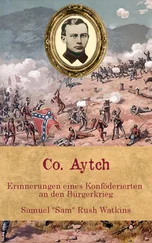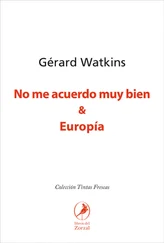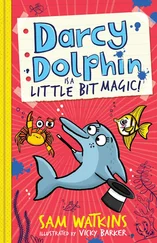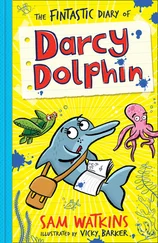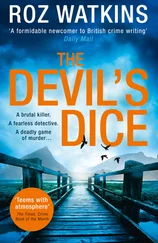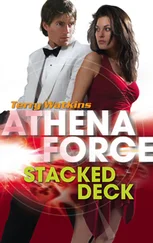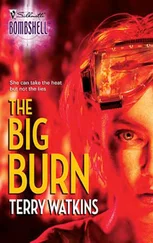On his forearm: We’re not her people.
“No.”
Never were.
“No.”
On his palm he wrote,
You’re okay.
“Yes.”
You’reokay.
We’re
“I know.”
You’reokay.
We’re
She’ll be
“I know.”
But these were just words she was saying.
They were ready to go. Some people woke from their siestas and emerged to watch them leave. No one spoke. Luz and Ray dawdled a little, though they were not sure why until Dallas appeared, Ig in her arms.
The girl’s big head swiveled around a little, taking everything in. Her freckles, the divots in her head, all the injuries visited upon her in so short a time. Luz quietly took Ray’s hand.
She wanted Ig to reach for her, to plead for her, to fling herself from Dallas’s arms and wail. She wanted this and more, more, more. Mama, I’ve got so much want in me. But Ig was silent, luminous as a candle, still and indifferent.
Dallas said, “Say ‘bye-bye,’ Ig.”
Ig did not.
Luz clasped Ray’s hand tighter, for fear she would reach up and touch the baby’s soft skin, her colorless hair — it would be her undoing.
Luz did not reach for Ig, but Ig did reach for Luz. One spindly arm outstretched between them, her grub fingers curling and uncurling. Luz watched it. Ray watched her watch it. Take it, he said in his mind, this prayer all his own. Luz stood, unmoving, as if hypnotized by the pale hand, its frank and tender need, and then she leaned back, away, forever out of reach.
“Her name is Estrella,” she told Dallas. “After my mother.”
Dallas nodded, then turned. As they went, Ig moaned and clucked a little, to Dallas. Luz and Ray watched them until Ig’s pale halo dissolved into the blinding glory of the dune.
Those sounds stayed with them as they fled, though Ray — all fear and blessed anticipation — would hear nothing beneath the fearsome whine of the lorry. But Luz kept on hearing those Ig sounds, her seer’s song. She tried to hear the ways it harmonized with the dune, though what she heard was the engine working, dead scrub crunching, dry sand yielding when they dived into the wash. She tried and tried and soon all she heard was her trying, Ig crying — no, that was her. Her breath shuddered, heart thundered, and so she did not hear the actual thunder at their back, nor the sky opening up. She did not smell the rain coming.
What she felt, beyond the painful range of Ig, was the astonishing relief of quitting. Taking her rightful position in that long line of runners and flakes. Those were her people salting mines, jumping claims, forging bond certificates, fudging the rail route, sending dudes searching for lost gollers. Following the plow and yellowing the news. Antsy pioneers, con artists and sooners, dowsers and gurus, Pentecosts and Scientologists. Muscle heads, pill-poppers, pep talkers, drama queens and commuters. Fluffers, carpetbaggers, migrant pickers disappeared, entrepreneurs in never-were garages, all those servers. She was all of them, at last. Malibu Barbie and Manzanar. San Simeon and San Quentin. Neverland Ranch and Alcatraz. She was Boyle Heights, Fruitvale, La Habra. Koreatown, Cambodia Town, Filipinotown, Japantown, Little Tokyo, Little Seoul, Little Manila, Little Saigon, Little Taipei, Little Moscow, Little Kabul, Little Arabia, Little Persia, Little Armenia, Little Pakistan, Little India, Little Italy, Little Ethiopia, Venice Beach. Drained lakes, sulfur seas, yucca forests dried to paper, redwoods blighted and departed, sequoias and pinyon pines tinder for a never-satisfied wildfire. These were her people. Speculators and opportunists, carnival barkers and realtors, imagineers, cowards and dreamers and girls. Mojavs. Eyes peeled for the flash of ore, the flash of camera, the wet flesh of fruit. Gold, fame, citrus. Every erotic currency harvested green or yellow or the profound underground black of oil gone red-brown when slid between two fingers. Clear — whatever color you want it to be. The color of diamonds kissed by light. Bathe in it, fling it into the air, carpet the desert in Bermuda and Buffalo and Kentucky blue. Blast it into the night sky, burble it at every porte cochere and waiting room atrium, adorn it with koi, trout, dolphins, killer whales. Freeze it with freezing machines and glide down atop it in the sunshine. Hold it icy against your injuries. Cut it with sugar, with liquor, with pesticide, blast for gold or gas with it, grow creatures with it. Ride it, spray it into the street, swim in it, soak in it, drink it in, piss it away.
The flood came upon them like an animal, like a vengeful live thing, earth-colored and savagely fast. Ray took it for a sandalanche at first, as the wriggling fingers surrounded the lorry. Its true properties came to them both at the same time. They looked at each other.
“It’s water, Ray. Is it water?”
Ray attempted to pronounce “Everything okay,” but his withered cords did not permit it. The flood lifted the lorry. The truck was afloat, no longer their own, and silty dun water around their ankles proved it.
Luz leaned over the edge of the lorry and baptized her hand. “Beautiful.”
Ray braked and steered, but these efforts were as useless as his voice. He remembered some rescue training, some advice for preserving one’s aliveness. Against great pain he tried to say Stay.
But Luz’s hand was on the handle. Ray reached for it as she swung the door open. She said, coolly and with a hard grace, “I have to go, baby.”
Ray lunged for her. But she was out of the lorry, stepping to her waist in the opaque rage of water. It pushed her and she lurched, nearly fell, but her face was serene. Ray scrambled to pull her in, but she would not allow it.
She would not allow it. Ray’s phrase years later, in Wisconsin, the Carolinas. In Greencastle, Indiana, where the soybeans no longer grew.
“I’m okay,” Luz shouted back over the miraculous roar of water, all those prayers answered late. “I’d be okay,” she revised, smiling before she slipped forever under, “if I could just get my feet under me.”
This novel is indebted to too many books, films, artists, and writers to list, but the following deserve specific acknowledgment: The Control of Nature by John McPhee, Beyond the Hundredth Meridian by Wallace Stegner, Cadillac Desert by Marc Reisner, The Worst Hard Time by Timothy Egan, The American Religion by Harold Bloom, Under the Banner of Heaven by Jon Krakauer, Demon Camp by Jennifer Percy, The Art of Dowsing by Richard Webster, Into Eternity directed by Michael Madsen, and Picture Me directed by Ole Schell and Sara Ziff.
Billy Dunn’s sermon on sulfur is based on that by Pastor Deacon Fred of Landover Baptist Church, entitled “Friends in Christ, Do You Have Demons in Your Colon?” Ray’s poetic influences are K. A. Hays & Will Schutt. Jimmer’s homeopathic remedies are informed by pamphlets on the topic published by the Aurand Press of Lancaster, Pennsylvania. Luz’s rooty epiphanies about nature imagery are inspired by the artwork of Anna Kell.
Finally, my sincere gratitude for the expertise of Ben Marsh, Chris Helvey and Henry Brean, and for generous support from the Creative Writing Program at Princeton University and the John Simon Guggenheim Memorial Foundation.
